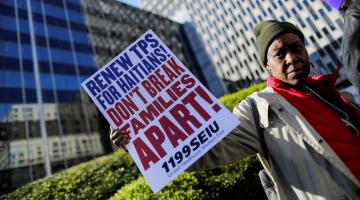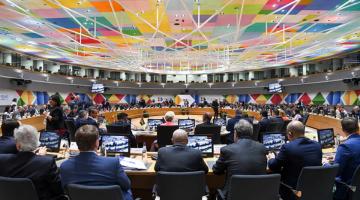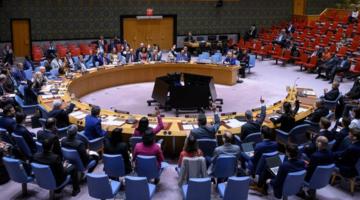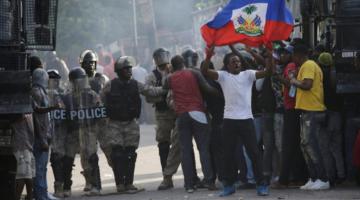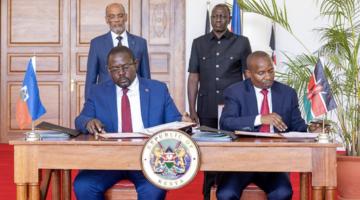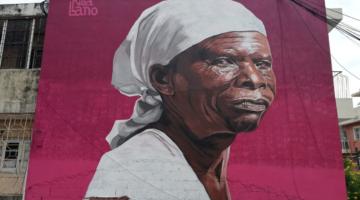September marked eleven years since the Dominican Republic passed the law that revoked the citizenship of millions of Dominican people with Haitian heritage. The government still maintains that the law is above board and adheres to the nation's Constitution. However, it has used this law to enforce mass detainments and deportations.
Originally published in Recognized Movement.
Following the protest held in front of the National Palace by the Movimiento Reconocimiento and other organizations on Monday, September 23, eleven years after the ruling 168-13, which unconstitutionally and retroactively deprived more than four generations of Dominicans born in the country between 1929 and 2007 of their nationality, an important public debate has been generated about the situation of our community. We have received numerous expressions of solidarity, which reflect the dignity, integrity and democratic commitment of journalists, intellectuals, human rights defenders, workers, feminists, educators and people who reflect the great diversity that constitutes the Dominican nation. The minority expressions of hatred towards our demonstration have come from the small groups that have always opposed the progress and democratization of the Dominican Republic.
The government has also responded to our fair, democratic demand for discrimination to cease and for the nationality of people who have been unjustly and unconstitutionally denationalized to be restored. Vice President Raquel Peña has stated that “we live in a democratic country, everyone has the right to protest for what they believe is right; but we are committed to complying with the Constitution and the laws of the Dominican Republic.” In his press conference on September 23 from New York City, President Abinader himself referred to our protest, stating : “We have to wait for the law to be complied with and the Constitution to be complied with, that is what we are respecting, the processes to comply with the law and the Constitution.”
It is positive that the government affirms the validity of the Constitution and that it will comply with what is established in it and in the laws. However, we believe that we should not wait any longer. The provisions of the laws and the Constitution must be respected and applied immediately, putting an end to eleven years of injustice and persecution that have violated the Constitution, creating an apartheid regime incompatible with a democracy.
Complying with the Constitution and the laws necessarily implies restoring nationality to all persons who were already Dominican before the 2010 Constitution. Constitutional Article 18 clearly establishes that Dominicans are:
“1) Sons and daughters of a Dominican mother or father;
2) Those who enjoyed Dominican nationality before the entry into force of this Constitution.”
Although the 2010 Constitution conditioned the ius soli , in terms different from those existing until then in the country, it did not eliminate it. Therefore, Dominicans are the children of Haitian immigrants or of other nationalities born after 2010, to parents legally residing in the country. People born in the country to Dominican fathers and foreign mothers are also Dominicans. However, the discriminatory, illegal and unconstitutional practice of registering these people as foreigners persists, denying the acquisition of nationality by ius soli and ius sanguini, simply because they are Dominican people of Haitian descent. These two conditions must be respected in the case of Dominicans of Haitian descent born after 2010.
Sentence 168-13 violated Article 18 of the Constitution by retroactively denationalizing thousands of people who were already Dominican when the 2010 reform came into effect. This was denounced on several occasions by President Abinader himself, who on December 5, 2013, in a public event at the UASD, stated that “unfair, uncivilized decisions are taking away the right to nationality from Dominicans of different faces. Today, we have come to stand in solidarity with all of them, we do so because we could have been one of them. I, like many thousands of other Dominicans, am a descendant of immigrants, my personal story is similar to that of many affected.”
During the 2016 election campaign, President Abinader reiterated to journalist Jorge Ramos : “I believe that we must respect the human rights and acquired rights of Dominicans of Haitian or other origin. It all started with ruling 168-13, which was a rather controversial ruling, and if it were up to that ruling, my grandparents came from Lebanon, and my father would not be Dominican.”
It is therefore urgent to adopt measures to restore nationality to all Dominicans of Haitian descent who had it when the 2010 Constitution came into force. This is the meaning of the public position we made on September 23.
There are two measures that the government can immediately take to respect the Constitution: deliver documentation to more than thirty thousand Dominicans of Haitian descent whose papers are in the possession of the JCE and have not been delivered, despite the fact that Law 169-14 ordered this a decade ago (the so-called group A); and the other measure is to reopen the offices of the Ministry of the Interior and Police for the execution and monitoring of Law 169-14, accelerating the process, currently frozen, for the special naturalization of the approximately eight thousand people who applied for this process, which according to the law itself should be executed in two years. As can be seen, there is no need to wait any longer, we have waited too long. What should have been done in two years has not been done in eleven years and the Dominican State is in arrears with the Constitution and Law 169-14 itself.
These two measures, however, would be insufficient to put an end to the problem of denationalization and statelessness of Dominicans of Haitian descent affected by ruling 168-13. Unfortunately, thousands of people did not qualify to be considered part of the so-called group A, nor did they register for the special naturalization of the so-called group B. However, they are also Dominicans, whose human rights cannot continue to be denied. The government must open a dialogue with social and human rights organizations to establish a roadmap to restore the nationality of all unconstitutionally denationalized people.
Finally, in order for the government to return to the path of the Constitution and the laws, we urge the Ministry of the Interior and Police to immediately end the campaign of illegal raids for immigration interdiction purposes, without a court order or the presence of prosecutors from the Public Ministry, which has been carried out over the last three years and which affects thousands of Dominicans of Haitian descent. The actions of hooded and unidentified police, military and immigration agents in these operations must also be stopped, since this also violates the Constitution. Detentions based exclusively on racial profiling violate the presumption of innocence and equality before the law, are discriminatory and violate the Constitution. The immigration detention of Dominicans of Haitian descent, as well as their expulsion, is also illegal and unconstitutional, since there is no penalty of banishment. Robberies, extortion, mistreatment, rape and murders of Dominicans of Haitian descent, black Dominicans and Haitian immigrants must stop immediately, as these are practices of the General Directorate of Migration that violate the Constitution and the law.
We expect a positive response from the President and a prompt meeting with a representative of the government to discuss the implementation of these urgent recommendations, based on the Constitution and the laws, as well as on respect for human rights and international treaties signed by the Dominican State.
Sincerely,
National Coordination of the Recognized Movement.

